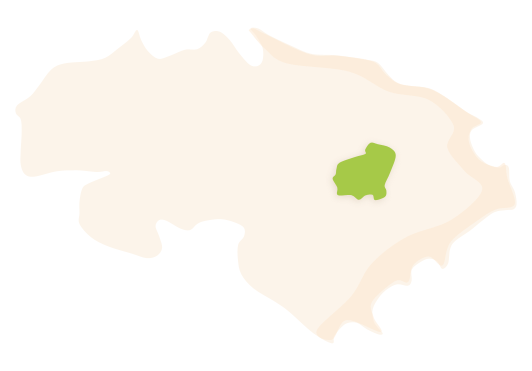Gata de Gorgos is a municipality located in the northwestern part of La Marina Alta. Its original name was Gata until, in 1919, “de Gorgos” was added. Located along the middle course of the River Gorgos, in the middle of the plain, the town is framed among Els Serrillars, La Garganta and El Castellar, with the south face of El Montgó in the background. Sitting at an altitude of 78 metres above sea level and with an area of 20.3 km², its inhabitants are known as Gaters and Gateres and constitute a population of 6,223 inhabitants.
 Gata de Gorgos' municipal district. Surface area: 20.30 km². Population: 6,223 (INE data 2021).
Gata de Gorgos' municipal district. Surface area: 20.30 km². Population: 6,223 (INE data 2021).HISTORY
The earliest settlements in the area can be found in the caves known as Coves Roges, where cave paintings and stone tools from 12,000 BC were discovered. There are also Roman vestiges in the areas of Els Ecles —with a Roman villa from between the 1st and 5th centuries AD— and La Rana.
As for the first reference to the municipality, one needs to wait until 1238, when, in a document from the so-called Distribution Book (“Llibre de Repartiment”), the farmstead of Gorgo appeared as dependent on the castle of L’Ocaive, which later (by the end of the 14th and beginning of the 15th centuries) already appeared documented as linked to the place of Gata, together with the farmstead of Els Ecles. The urban centre originated on the north bank of the river and gradually expanded onto the other side up until the 17th century, resulting in the current urban layout.
In 1609, after the expulsion of the Moriscos, Gata, which had about 150 homes, became deserted. Soon after, the streets began to fill up with life again: on the 4th of March, 1611, the Municipal Charter was signed by the new settlers and Pere Acasi de Joan Montagut i d'Íxer, lord of L'Alcúdia, La Vall de Xaló and Gata. However, almost half of the 36 signatories did not remain there. In 1645, Jerònima d’Íxer and 48 villagers agreed on a new contract in which, instead of asking for a direct monetary tax from the inhabitants, the villagers had to give a share of the harvests. The origin of the new people of Gata was both Valencian and insular (mainly from Majorca, with some coming from Ibiza), which explains some of the particularities of the local way of speaking. In 1646, the dominant surnames were Montfort, Mengual and Mulet, amongst others.
During the 19th century and with the rise of the raisin industry, the mountains of Gata were turned into terraces and many “riuraus” (or “risaus”, as they are called in the town) were built, with their sun dryers to dry the raisins. Another of the emerging activities during that period was the weaving carried out with the leaves of the small palm tree called Chamaerops humilis, which has a long tradition in Gata, as can be seen due to the fact that both endeavours (raisins and palms) have been documented since the 15th century.
In 1914, the railway arrived to the town, which led to an increase in trade of the products of local crafts. With the decline of the traditional craftsmanship during the second half of the 20th century, the town reconverted its economy, without losing its idiosyncrasy, and specialised in craft shops and wicker furniture. These crafts and the ensuing trade give the town its own identity: it has become known for its guitars and wicker products. The products give Gata de Gorgos well-deserved fame and make everyone partake of its essence when buying them in the streets and workshops. The most typical photo of this town is the main avenue proudly displaying the products of its local culture.
FESTIVITIES
- The festivities of the neighbourhood of El Raval, in honour of Saint Antoni, are celebrated on the 17th of January.
- Saint Joan is celebrated on the 24th of June.
- The festivities of El Santíssim Crist del Calvari, patron saint of Gata, take place from the end of July until the 6th of August.
- The festivities in honour of Saint Miquel Arcàngel are celebrated on the 29th of September.
GASTRONOMY
- ”Pilotes de putxero”: meatballs cooked in a soup.
- ”Berenaret de Pasqua”, which is a typical Easter afternoon snack: a traditional stew eaten during Easter that contains meat, vegetables, sausages and other ingredients.
- ”Sang amb ceba”: blood with onions.
- Oven-cooked rice.
- ”Coques” (flatbreads).